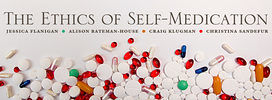It was a pleasure to see Dr. Flanigan’s response to my essay and especially to see enumerated the points on which we agree. However, there remain significant points on which we do not. First and foremost is whether autonomy is the most important principle in bioethics. I do not believe it is. The reason I mentioned human subjects research was because this is the sector of bioethics for which autonomy has been the paramount principle, due to its fraught history of scandals and abuses. Yet even here, autonomy has bounds. I went on to discuss public health to show how, in a different sector, autonomy sometimes is virtually discounted. Thus I don’t think you can claim that autonomy is the most important principle in bioethics; its importance varies in relation to context.
To argue that people are autonomous agents always able to make their own choices about the use of pharmaceuticals, you must hold to one of two beliefs. One, that personal choice is so important that we must be willing to tolerate the foreseeable individual and community harms from allowing persons—regardless of their knowledge of drugs, understanding of their medical conditions, linguistic competency, or access to sources of medical advice—unfettered access to these agents as they wish, bound only by the advice they wish and are able to seek out. Or, the second possibility: that all people are capable of obtaining expert guidance to make decisions about drug use, if and when they wish, and thus there is no need to install safeguards. I am unwilling to endorse the first. I do not agree that there is some natural, constitutional, or other right to free access of pharmaceuticals in any way strong enough to outweigh the pragmatic harms that would arise from such a policy. As for the second, I believe the structural impediments in our system of health financing and access are such that putting the onus on those who desire advice about pharmaceuticals to find it would create an unjust two-tiered system: Those with access to advice would have enhanced liberty, while those without such access would be left to their own devices about how to safeguard their health and that of their family members and community.
Dr. Flanigan does not hold either of these positions; rather, she takes a more nuanced approach in which there are legitimate reasons for placing restrictions on access to certain pharmaceuticals, most commonly the harm principle (I have no right to engage in activities that can harm others, yet I can engage in whatever activities I want if they only harm myself). The question is determining what scenarios rise to the point where restrictions on access are legitimate. After all, determining what constitutes harm to others is somewhat in the eye of the beholder. If I stockpile my medicine, am I harming others by potentially impacting the supply of the drug or its cost? If I use drugs unwisely and incur ambulance and hospital expenses, am I harming fellow taxpayers or those who share an insurer with me?
That we need to recognize nuance in making policy is in keeping with what I teach my students: that we have a “toolbox” of approaches, and there is no one-size-fits-all solution to all issues. Rather, we must analyze a situation and then determine which policy approach is best. If the goal is to reduce use of something, it would be unwise to choose to ban it and risk incurring some level of public wrath, if less intrusive measures, like education or persuasion, would be sufficient to meet the goal. Policies range in their degree of intrusiveness, and the rule of thumb is to use the least restrictive alternative that will still meet the specified objective. However, in choosing which policy alternative to use, one must be aware of context. To rely on education—say, of schoolchildren—would obviously be insufficient if many of those in the affected population don’t go to school. To rely on taxes to drive down use of some item won’t work if the item is sold primarily by unregulated vendors.
U.S. medical drug policy has evolved over time. I see this as evidence of policymakers selecting from our policy toolbox and trying approaches that seem best suited for the particular situation at the particular time. Once unregulated, drugs are now divided into categories: over the counter, prescription, and controlled (i.e., only by prescription and subject to additional regulation). Drug registries, first the subject of fear and concern, have become the norm, with every state in the nation now tracking who is prescribed opioids, in an attempt to stem the current public health crisis. At the same time, there are efforts to make certain relatively safe drugs like birth control and naloxone available without prescriptions.
As I mentioned in my original essay, policymaking is inherently a blunt tool. When trying to find an approach that works for a heterogeneous population, some individuals will no doubt be subject to restrictions that they don’t really need, and as a result, they will be able to object that a paternalistic “nanny state” is unnecessarily depriving them of individual liberties. On the other hand, other individuals for a variety of reasons could probably use even more protection that what the policy affords. By working to find the least restrictive policy to meet a specific policy goal, we seek to respect autonomy—not as an absolute or a paramount principle, but nevertheless as an important principle—while prioritizing the principle that I think motivates most public health activities: beneficence.

